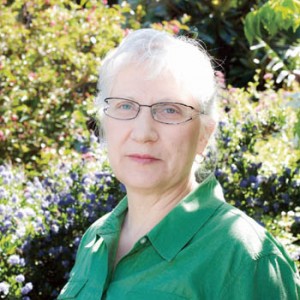University science departments today face many challenges, not least the call to teach more students with fewer staff, and less money. As
a result, the pressure is on to cut costs and make efficient use of time…and laboratory components of classes represent some of the more
expensive and labour-intensive aspects of science education. Since my days as an undergraduate student, there has been a gradual trend
– to reduce the number of laboratory classes in a semester, or to drop lab components of courses and replace them with problem sets, more
lectures, or more recently virtual, computer-based labs.
This trend is disturbing, for two reasons (well, more than two, but time is limited).
First, it deprives students of the opportunity to actually do science. Imagine if music performance majors didn’t play instruments or sing
until their senior year, or if athletes trained without playing their sport, until they registered in “Basketball 495, Senior Practicum”. Of
course, those would be rather absurd situations, but as an analogy of how science programs are typically structured, increasingly it’s not far
off.* Of course, history and theory have their place in science education, but they can’t be everything. Because doing science is very much an
art – there are manual skills involved in manipulating equipment, skills of intuition needed to frame an interesting question, and formulate
and test hypotheses to attempt to answer it, skills of flexibility and patience to work with and explain the often ambiguous, messy results of
real-world experiments…
If we want to produce insightful, creative scientists, or professionals in science-based fields like medicine, engineering, or even a citizenry
that can truly be described as scientifically literate, we need to give our students the opportunity to practice doing science. That’s what this
lab is for.
Second, beyond just gaining skill in scientific investigation, there are less-tangible benefits to laboratory education that are difficult for
students to replicate by reading a textbook or listening to a lecture. My job, as a biology teacher, is to invite my students to fall in love with
biology as a field of study. That can be done via lectures, yes, but there’s something much more alluring about science when one has the op-
portunity to actually try their hand at it.
My father taught chemistry at the University of Waterloo for over 30 years. I once asked him why he chose to go into chemistry in the first
place. His answer was that more than anything else, it was the vivid colours and strange smells of chemical solutions that drew him in.
A few years ago, I found my PhD advisor, on a particularly stressful, no-good, very bad day, sitting at the microscope looking at grasshopper
ovaries, which had little to do with anything that needed doing at the time. He just looked up at me and said, “I decided I needed to look at
beautiful things for a while,”. Doing science is a sensory experience, and in many ways, a return to being a kid and being thrilled at discov-
ering how something is put together, or how one thing leads to another.
This fall, students in my introductory biology class will meet a species of bacterium that infects plants, and actually genetically engineers its
host, forcing the plant to provide food and shelter. Later in the term, they will bring in food or other household items, and test them for their
tendency to cause mutations in bacteria, and most likely be stunned, fascinated, and perhaps disturbed by what they discover. And just
maybe, they’ll start to fall in love.
That course is just one among seven that will use this facility this school year. It’s a small facility, but it’s a good one, and it allows my col-
leagues and I to develop curricula that will give our students opportunities they would not have in similar courses at other institutions.
That’s why this laboratory is so important, and that is why I want to say a big thank-you to two levels of government, and a number of
donors – the Duecks in particular – for your support in making this kind of education possible. I hope and pray that this facility, and those
of us who work in it, will be worthy of the faith and goodwill you have shown us.
* Lindgren, Clark (2010) “Teaching by doing: turning a biology curriculum upside down.” Skeptic 15(4):35-37.
September 3, 2010
John Brubacher, Professor of Biology, gave a speech at the opening of CMU’s new Science Lab:
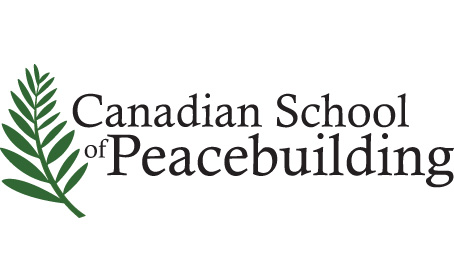
[youtube]http://www.youtube.com/watch?v=vDTQklX0YaE[/youtube]
Canadian Mennonite University Hosts Grand Opening of New Science Laboratory
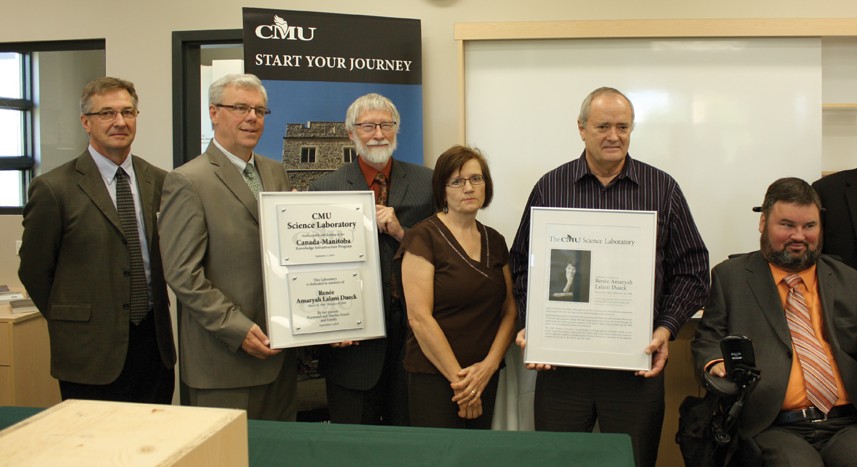
Premier Greg Selinger, MP Steven Fletcher, Minister of State for Democratic Reform, and Canadian Mennonite University (CMU) President Dr. Gerald Gerbrandt today proudly opened CMU’s new science laboratory that will benefit students for many years to come.
“This advanced laboratory setting will strengthen CMU’s science programs and support high-quality instruction for students,” said Premier Selinger. “Our government is pleased to be part of the ongoing co-operation with the federal government under the Knowledge Infrastructure Program.”
Canadian Mennonite University received a total of $301,500 from the federal government under the federal and provincial partnership agreement in the Knowledge Infrastructure Program (KIP), with Manitoba providing an additional $150,800. CMU held a successful fundraising campaign for the project and raised over $350,000 in support from private donors towards the facility.
CMU students now have a new 1,200-square-foot teaching laboratory, a preparatory lab and improved storage facilities. The specialized space will allow the institution to grow its course offerings and teach advanced-level science courses with lab components in biochemistry, organic chemistry, physics, genetics, cell biology and microbiology.
“Our government’s investment in post-secondary infrastructure has given our students and researchers the tools they need to be global leaders in their fields and pursue world-class excellence,” said Minister Fletcher. “Our government’s investments in the knowledge economy strengthen Canada’s position as a world leader in science and technology.”
“Increasingly, students are coming to CMU looking to build an academic base in the sciences for such professional fields as nursing, agriculture, medicine, pharmacy, engineering and education. We are grateful for the support of our federal and provincial governments and private donors to build this new lab, which considerably strengthens CMU’s capacity to deliver a broadly-based, Christian liberal-arts education. Students seeking a future in science will have a strong foundation to begin that journey,” said Gerbrandt.
The KIP investment is part of the federal government’s two-year, $2-billion plan to repair and expand research and educational facilities at Canadian colleges and universities. Since its inception last year, KIP has helped to generate the advanced technological infrastructure needed to keep Canada’s colleges and universities at the forefront of scientific advancement.

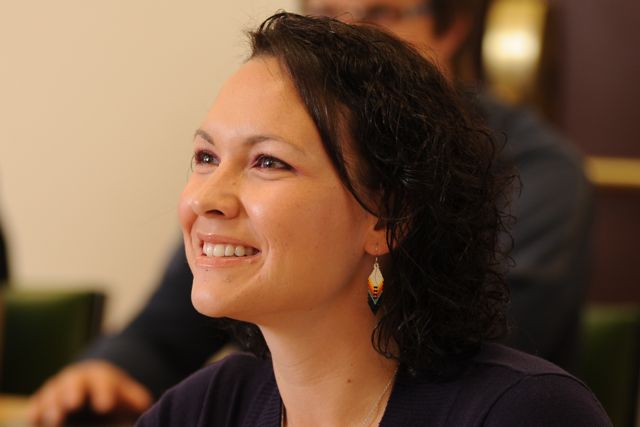
Christy Anderson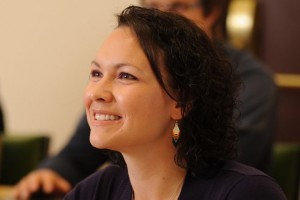
Communications and Media Major
Interview Date: August 8th, 2010
In this interview, Christy speaks with David Balzer – host of Sunday@CMU Radio,about her life story and what God’s grace has meant for her.
[audio:http://www.cmu.ca/media_archive/wp-content/uploads/2011/02/100808ChristyAnderson.mp3|titles=100808ChristyAnderson]
Play/Download Here
Winnipeg author Dora Dueck will be reading and signing her second novel, This Hidden Thing, in Lichtenau Church at the Mennonite Heritage Village on Monday, August 2, at 1:30 pm.
This Hidden Thing tells the story of Maria Klassen, a young Mennonite woman who has recently emigrated from Russia. She soon finds work as domestic for a wealthy English family in Winnipeg, while her family settles in the nearby town of Winkler. Later in the novel, we meet Maria in adulthood – devout, industrious, and dedicated to her family. Yet she is reserved and intensely private. This is the story of a life that contained passion and suffering that no one knew.
Dora Dueck is the co-editor of Northern Lights: An Anthology of Contemporary Christian Writing in Canada. Her stories have been featured on CBC Radio, and in journals such as Room, Prairie Fire, Rhubarb, and Journal of Mennonite Studies.
For more information about This Hidden Thing, visit www.cmu.ca/cmupress.
CMU PRESS is an academic publisher of scholarly, reference, and general interest books at Canadian Mennonite University. Books from CMU Press address and inform interests and issues vital to the university, its constituency, and society. Areas of specialization include Mennonite studies, and works that are church-oriented or theologically engaged.
Canadian Mennonite University (CMU) is a Christian university in the Anabaptist tradition, offering undergraduate degrees in arts and science, business and organizational administration, communications and media, peace and conflict resolution studies, music and music therapy, theology, and church ministries, as well as graduate degrees in Theological Studies and Christian ministry. Located in Winnipeg, Manitoba, CMU is a member of the Association of Universities and Colleges of Canada (AUCC). Visit www.cmu.ca
For CMU PRESS information, contact:
Jonathan Dyck , CMU PRESS Project Manager
cmupress@cmu.ca
204.487.3300.
For CMU information, contact:
Nadine Kampen, CMU Communications & Marketing Director
nkampen@cmu.ca
Tel. 204.487.3300 Ext. 621
For release July 21, 2010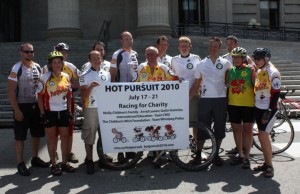
Arvid Loewen posted a tremendous personal best over this race distance that saw him reach the perimeter of Winnipeg at 12:43 pm, a time that shaved 18 hours off of earlier rides. Loewen arrived downtown at the Legislature today at 1:45 pm, accompanied through town by a police escort and met by a large crowd of supporters and the other Hot Pursuit riders. Loewen raced solo in support of the Mully Children’s Family Charitable Foundation, riding at record pace from July 17, 7:00 a.m. through to July 21, 1:45 p.m., stopping only 4 hours per day for rest periods. For race statistics, visit www.hotpursuit2010.com/Hot_Pursuit/Home.html
Says crew member Paul Loewen: “Arvid biked 2330km in 99h 43m. Of that time, 14 hours was off bike. So his riding time was about 86 hours. That makes his on-bike average about 27km/h. His previous best was 118 hours, so he beat that time by 18 hours.”
Team CMU, racing in relay format with five riders cycling non-stop from July 18 to July 21, for a total of 65 hours, reached the Legislature at 2:43 am July 21, posting a race finish time of 2:01 am at the perimeter. Team CMU finished 19 hours ahead of their estimated racing time. Team CMU’s fundraising efforts will provide financial support for CMU’s international student financial assistance programs and practica. Riding for Team CMU were CMU faculty members Chris Huebner and John Brubacher, along with Kevin Kilbrei, and alumni Craig Penner and Jon Guenter.
The Gogos team of four women “grannies,’ including 80-year old Shirley Polson along with Elsie McKinnon, Evely Ko, and Jo Maetche, completed their race from Calgary to Winnipeg this morning, also riding in support of the Mully Children’s Family Charitable Foundation.
The Gogos riders were cycling today at a pace of 31.5 km per hour. Because Arvid was out in front of them, they decided to end their race 10 kilometeres past Portage la Prairie and drive the final stretch in their van, in order to arrive in Winnipeg on time to welcome Arvid at the finish.
“This is about the children of the Mully Children’s Family and support for them,” says crew member Maureen Kehler. “We really wanted to support the work that Arvid does, and we wanted to help welcome him at the end.” The team ended their race logging 45 hours and 52 minutes and estimated that had they continued at that pace, their arrival at Winnipeg’s perimeter would have been at 1:28 pm.
Team Winnipeg Police accompanied Arvid on the final leg of his journey as part of a police escort. Although circumstances caused Team WPS to withdraw part way through the race, the team continued their support for Hot Pursuit in raising funds for The Children’s Wish Foundation.
Solo rider Arvid Loewen leaves White Rock July 17; pursuit riders start July 18
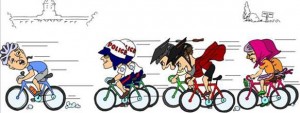 For release July 15, 2010
For release July 15, 2010
Arvid Loewen opens the race on July 17 at 7:00 am, with Team CMU leaving 24 hours later and Team WP leaving 27 hours later. The solo and team riders will cover 2330 kilometres in a round-the-clock race back to Winnipeg.
The two Winnipeg pursuit teams will attempt to overtake Arvid Loewen, who is racing for the Mully Children’s Foundation. CMU’s team of five cyclists, made up of faculty members Chris Huebner and John Brubacher, along with Kevin Kilbrei, and alumni Craig Penner and Jon Guenter, will race from Vancouver to Winnipeg to raise money for international student financial support. Team Winnipeg Police are raising funds for The Children’s Wish Foundation. Riders anticipate arriving at Manitoba’s legislative grounds on Wednesday evening, July 21.
Team GoGo joins the race at Calgary. Shirley Polson, 80 years of age, and four of her “granny” friends will leave Calgary as a relay team on July 18 at 8:00 am. They expect to be in Winnipeg in advance of the other teams, waiting at the finish line for the riders. They have named their team the “Gogos” after the Kenyan word for “grandmother.”
“Arvid has incredible endurance and can cycle 20 hours a day,” says Team CMU’s Chris Huebner. “We are not in his league, but we will be working as a team, cycling day and night, trying to catch him.”
Located in Winnipeg, Manitoba, CMU has over 1,800 students at its Shaftesbury Campus in Southwest Winnipeg, at Menno Simons College in downtown Winnipeg, and enrolled through its Outtatown discipleship program. CMU is a member of the Association of Universities and Colleges of Canada (AUCC).
SEE CONTACT DETAILS BELOW…
See websites (listed below) for:
• daily race updates
• race progress maps
• blog commentary
• photo galleries
• audio/video files
www.hotpursuit2010.com/Hot_Pursuit/Home.html
www.cmu.ca/hotpursuit
www.wpscopsforkids.ca
MEDIA CONTACT IN WINNIPEG
Nadine Kampen nkampen@cmu.ca
204.487.3300 ext. 621 | toll free 1.877.231.4570
Research focuses on Canadian Prairie public and private collections
For release July 14, 2010
Canadian Mennonite University recently hosted a meeting of a unique history research group comprised of scholars from the University of Saskatchewan, the University of Manitoba, and CMU. With a special project of “Mapping the Pages,” the group’s purpose is to bring to light the little-known, unknown, or otherwise surprising medieval and early modern books that are in Canadian Prairie collections, either public or private.
“This group is developing a database that will facilitate the gathering of information about these books as well as their further study,” says CMU Associate Professor of English Paul Dyck. “One of the goals is that book owners will be able to enter information about their own books in the database. We see this is a natural and promising connection between our institutions and the public, and an important way to capture and share information about unique and valuable history resources.”
The project is headed by Sharon Wright of St. Thomas More College, with STMC providing support for travel, meals, and accommodation, and the host institution, CMU, providing meeting space and a luncheon meal. The group held its first meeting last year at Notre Dame in Wilcox, Saskatchewan. This second meeting, held June 28 & 29, included trips to the University of Manitoba’s Archives and Special Collections, the Mennonite Heritage Center Archives, and the Hudson’s Bay Archives, as well as to CMU’s letterpress print shop.
2010 meeting participants were Dietrich Bartel (CMU), Sarah Benson (Theological Union, U of S), Paul Dyck (CMU), Frank Klassen (U of S), Shelley Sweeney (U of M), David Watt (U of M), and Sharon Wright (STMC).
Canadian Mennonite University is a Christian university in the Anabaptist tradition, offering a broad range of undergraduate degrees and two graduate degree programs. CMU has over 1,800 students, including Menno Simons College and Outtatown students, and is member of the Association of Universities and Colleges of Canada (AUCC) .
For information, contact:
Nadine Kampen
CMU Communications & Marketing Director
nkampen@cmu.ca; 204.487.3300 Ext. 621
Essay collection includes works by theologians Craig Hovey, Harry Huebner and Stephen Long
For release July 5, 2010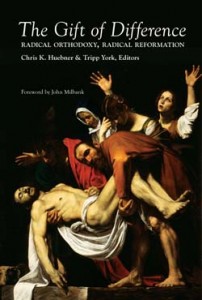
CMU PRESS is pleased to announce the publication of The Gift of Difference: Radical Orthodoxy, Radical Reformation edited by Chris K. Huebner and Tripp York. The Gift of Difference is a collection of essays in which theologians such as Craig Hovey, Harry J. Huebner, and D. Stephen Long consider the strengths and weaknesses of Radical Orthodoxy in dialogue with the Radical Reformation tradition. Writers in this volume engage topics such as ecclesiology, martyrdom, worship, oath-taking, peace and violence.
In recent years, Radical Orthodoxy has become an important and influential movement in contemporary theology and philosophy. Spearheaded by John Milbank, Catherine Pickstock and Graham Ward, Radical Orthodoxy enlists the resources of classical theology to engage the current strongholds of secular and religious thought.
Proponents of Radical Orthodoxy argue that the Enlightenment project to remove reason, ethics, politics and economics from a theological framework culminates in the nihilism of postmodern discourse. They suggest that much contemporary theology is idolatrous in nature because it takes the isolation of such disciplines for granted.
In the Foreword, John Milbank writes that “[modern Mennonites] see the Church itself as the true polity and (unlike most of the magisterial Reformation) they see the possibility of ‘living beyond the law’ in terms of a new sort of social and political practice.” What might this concrete expression of Christian discipleship have to suggest to a movement like Radical Orthodoxy? What gifts does Radical Orthodoxy offer academics, ministers and laypeople from Radical Reformation tradition?
“This book explores both common and divergent themes between Anabaptist/Mennonite theologians and their counterparts in the Radical Orthodoxy movement,” says co-editor Chris K. Huebner. “For example, while they jointly reject as false the dualisms characteristic of modernity, the manner in which questions of peace and justice get framed remains an ongoing debate.”
Chris K. Huebner is Associate Professor of Theology and Philosophy at Canadian Mennonite University. He is the author of A Precarious Peace: Yoderian Explorations on Theology, Knowledge, and Identity (Herald Press, 2006) and co-editor, with Peter Dula, of The New Yoder (Wipf & Stock, 2010).
Tripp York is an Instructor of Religious Studies at Western Kentucky University in Bowling Green, Kentucky. He is the author of The Purple Crown: The Politics of Martyrdom (Herald Press, 2007) and Living on Hope While Living in Babylon: The Christian Anarchists of the 20th Century (Wipf & Stock, 2009).
The Gift of Difference: Radical Orthodoxy, Radical Reformation (CMU PRESS) is available from the CMU Bookstore, located at 600 Shaftesbury Blvd., Winnipeg. Contact cmubookstore@cmu.ca; telephone 204.487.3300. The cost is $29.50.
CMU PRESS is an academic publisher of scholarly, reference, and general interest books at Canadian Mennonite University. Books from CMU Press address and inform interests and issues vital to the university, its constituency, and society. Areas of specialization include Mennonite studies and works that are church-oriented or theologically engaged. Visit www.cmu.ca/cmupress
Canadian Mennonite University (CMU) is a Christian university in the Anabaptist tradition, offering undergraduate degrees in arts and science, business, communications, peace and conflict resolution studies, music, theology, and church ministries, as well as graduate degrees in Theological Studies and Christian ministry. Located in Winnipeg, Manitoba, CMU is a member of the Association of Universities and Colleges of Canada (AUCC).
For CMU PRESS information, contact:
Jonathan Dyck CMU PRESS Project Manager
cmupress@cmu.ca
204.487.3300.
For CMU information, contact:
Nadine Kampen CMU Communications & Marketing Director
nkampen@cmu.ca
Tel. 204.487.3300 Ext. 621

